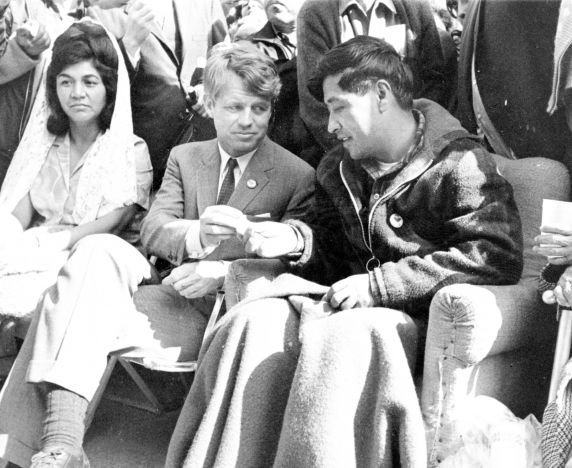 |
| Above left, Abelardo B. Delgado |
The Movement Scope
Share
by Abelardo "Lalo" B. Delgado
When we speak of the scope of the movement, it is an attempt to, in this chapter, attach some measurement in terms of quality and quantity of participation by Chicanos (also, what is directly and indirectly contributing to its growth, as well as impeding its development).
The question of quality as apostolic zeal is the most essential one here, rather than the question of numbers. We could claim one tenth of the Chicano population as being involved in the movement and that would be true and impressive, but I'm more concerned with the seriousness of a couple of dozen individuals whom I have personally met.
The determination of the few individuals is such that it has left me with the impression that we cannot help but succeed with such men and women pushing so hard. It almost seems at times that we are seeing Christianity itself at its embryo stages to hear these individuals speak of carnalismo and self-determination.
Perhaps, attached to the quality in the movement, is the spiritualism itself that is self-multiplying and indestructible. Those of us close to the movement, measure quality in terms of lives which are dedicated to: (1) destroying the attitudes and prejudices that strangle our own bland progress, and (2) those who build community tunnels by which to escape the economic and political control on which those attitudes and prejudices are built.
One measure scope by the limits reached, and we have made remarkable advances in practically all fields.
Those advances of most consequence are those made in fields which called attention to the deplorable status of thousands of migrants. Here, we cannot help but admire and praise the efforts of Cesar Chavez, Dolores Huerta, Tony Orendain and the hundreds of other huelguistas and organizers. This is one piece of work not attempted by the best “gavacho” unionista and considered practically impossible. This has been one task tried a dozen times before, only to encounter failure.
The grape and the black thunderbird in the red flag gave this nation an identification of what determined and united Chicanos can do. Whatever progress was made in the fields on behalf of farmworkers, was made under the most adverse and harsh conditions possible which best shows the national victory enjoyed by unionized farmworkers. Chavez well knows that he could not have won his struggle without nationwide Chicano support to the point that many Chicano children are unfamiliar with grapes.
Chicanos have proven they can muster some economic control in this nation, and armed with a just and valid cause, and refraining from violent confrontations, and relying heavily on passive resistance and a devil-like persistence, can meet any goal they set. Many movement people charge that Chavez may be one hell of an organizer, but not a leader in the Chicano Movement in that he fails to embrace many other areas of concern affecting millions of other deprived Chicanos.
Whether the charge is a valid one or not, the fact remains that we can rally behind our national leaders, and whether movement Chicanos claim Chavez owes them something or whether Chavez himself acknowledges the movement, the fact remains that he is a Chicano whose immense contribution cannot be ignored or belittled.
It is said in jest that the true yardstick of the Chicano Movement is Texas for there, the atmosphere to demand, confront, speak out, and advance is not as permissive as California or Colorado. What, in fact, has happened in places like El Paso – MACHOS, MAYO, MECHA, the question of bad housing, drugs, and out-right poverty – is an indication that the movement is real and growing and here to stay.
Most impressive is the struggle of MAYO in the valleys, in San Antonio and the political victories and challenges of La Raza Unida. In Texas, too, as of this writing, a completely Chicano-run college is being initiated. I can honestly say that it may be a jest to many, but to Chicanos in Texas, it is a very serious and deadly struggle.
In Colorado, New Mexico, Arizona, evidence of proud challenges to the controlling communities for recognition and full participation are now a way of life with most Chicanos. Utah, Oregon, and Michigan keep in stop also with the movement and even a sort of healthy competition has come about in which one state would brag to another of achievements within the Chicano communities.
You hear of Governor's commissions on Chicano problems in Oregon and thousands of token Chicano position opened simply because of pressure exerted through the movement. Do not get me wrong, I'm not knocking these token position for even those can be turned to work for the movement if used to serve La Raza, who was responsible for getting them; and not our abilities alone.
Look in your own community and measure for yourself the extend of the Chicano contribution, the changes that have come about because of it, housing, jobs, education, police relations, welfare, hospital, attitudes, barrier knocked down and the more labor pains you see and feel, the healthier the birth of better things to come.
FIN
Other parts of this series:
Part IV Goals
from The Chicano Movement: Some Not Too Objective Observations by Abelardo B. Delgado, (Denver: Colorado Migrant Council, 1971), prepared by the Colorado Migrant Council. Published with permission from the Delgado Family. Special thanks for Dolores Delgado. (c) Abelardo Delgado 1971.









No comments:
Post a Comment